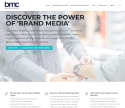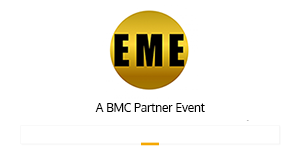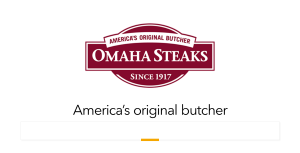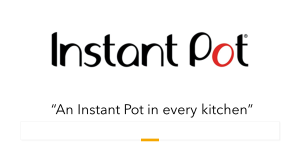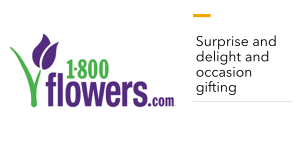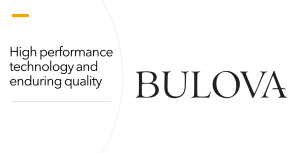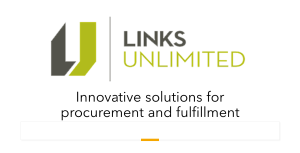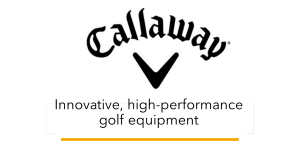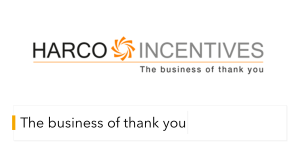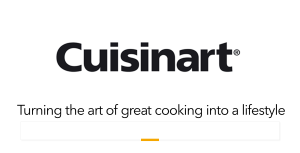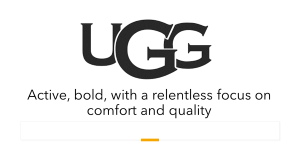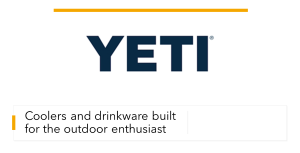IRF Study Has Big Wake up Call to the Industry on Program Design
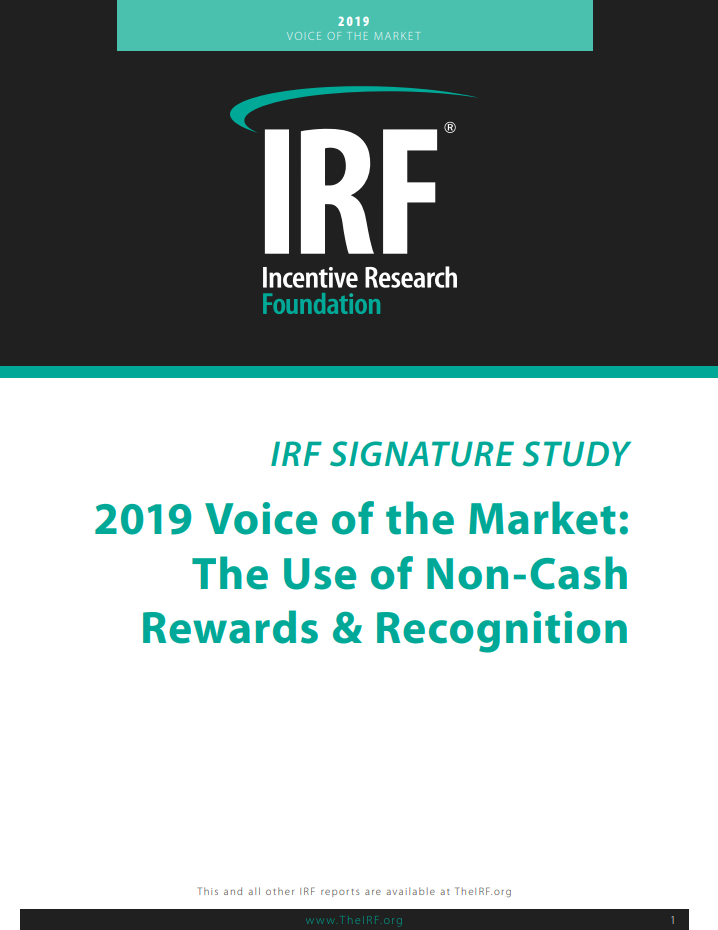 Confirming what RRN has suggested for years, forty-five top buyers of incentive programs told researchers involved with the IRF’s 2019 Voice of the Market: The Use of Non-Cash Rewards and Recognition that they generally don’t consult their incentive company vendors on incentive program design and don’t even know such services exist.
Confirming what RRN has suggested for years, forty-five top buyers of incentive programs told researchers involved with the IRF’s 2019 Voice of the Market: The Use of Non-Cash Rewards and Recognition that they generally don’t consult their incentive company vendors on incentive program design and don’t even know such services exist.Key Findings
- Organizations have an expansive view of non-cash rewards and use all types in many combinations. Gift cards are popular when ease of administration is key, or there are many people are involved. Organizations turn to merchandise when the goal is to create excitement, buzz, and a reward experience is desired.
- Travel is considered the “penultimate reward—expensive and difficult-to-administer but offering enormous impact from an experiential perspective.”
- A dynamic approach to rewards and recognition. Organizations specifically use rewards and recognition because of their flexibility and adaptability and not necessarily as part of long-term programs.
- Competitive pressure plays a role in reward and recognition emphasis, the study found.
- Communication can be enhanced—while respondents seemed satisfied with program design, many admitted that room exists for improvement in getting the messages across.
- These buyers generally have no professional networks in the incentive space and do not frequently connect with “experts” on design, nor had their web searches yielded anything compelling, they reported.
- More understanding of the reward experience. Buyers did seem to have a firm understanding of the difference between compensation and rewards and recognition. “There is intuitive recognition that memorable rewards will have a more lasting effect on engagement, and that ‘memorable’ will be different person-by-person. Many program owners noted that even the recognition aspect of a reward needs to be personalized, as some people may enjoy public acknowledgment while others prefer a more individualized approach.”
- Cash and cash-equivalents favored for ease of administration and speed. Even strong proponents of non-cash rewards weave cash and cash equivalents into their programs because of the need for speed, ease of administration, or to manage a large audience.
- Planners don’t necessarily have and are not called upon to provide clear ROI measures. While highlighting the types of KPIs (performance measures) organizations say they use, the report noted that, “While they prefer to be prepared with this data, they note it is rare that they are asked to review this data with the management team. Instead, there tends to be broad support for these initiatives at the executive level, and programs are accepted as part of the organizational culture.” As for performance-based programs, such as sales and channel incentive programs, as well as safety and productivity rewards and recognition for employees, “Programs that are designed to impact specific KPIs will be measured by their success in delivering the results desired. Because these programs emerge from a need to address metrics, there is a natural measurement system (and baseline of performance) already in place. Program owners do not spend much time or energy analyzing results, as they are often self-evident by the nature of the programs.
A Stunning Conclusion for IRR Industry Leaders
Master the Principles of Enterprise Engagement to Achieve Organizational Goals and Enhance Your Career
- Profit from a new strategic and systematic approach to engagement to enhance your organization’s brand equity; increase sales, productivity, quality, innovation, and safety, and reduce risks.
- Get trained to become a Chief Engagement Officer for your organization.
- Achieve ISO 10018 Quality People Management Certification to demonstrate your organization’s strategic commitment to people to your customers, employees, distribution partners, vendors, communities, investors, and regulators.
- Learn how to create Sustainability or Integrated Reports for Your Organization or Clients.
- Get up-to-speed on ISO human resources standards and guidelines to enhance HR performance.
Live Education: Enterprise Engagement in Action. Take advantage of scheduled monthly live webinar preparation courses for the Certified Engagement Practitioner designation consisting of three one-hour classes and of quarterly Advanced Engagement Practitioner courses consisting of three one-hour webinar classes. The AEP course is for individuals or teams seeking preparation ISO 10018 professional certification status. ICEE periodically runs regional one-day workshops on ISO 10018 Quality People Management principles and certification.
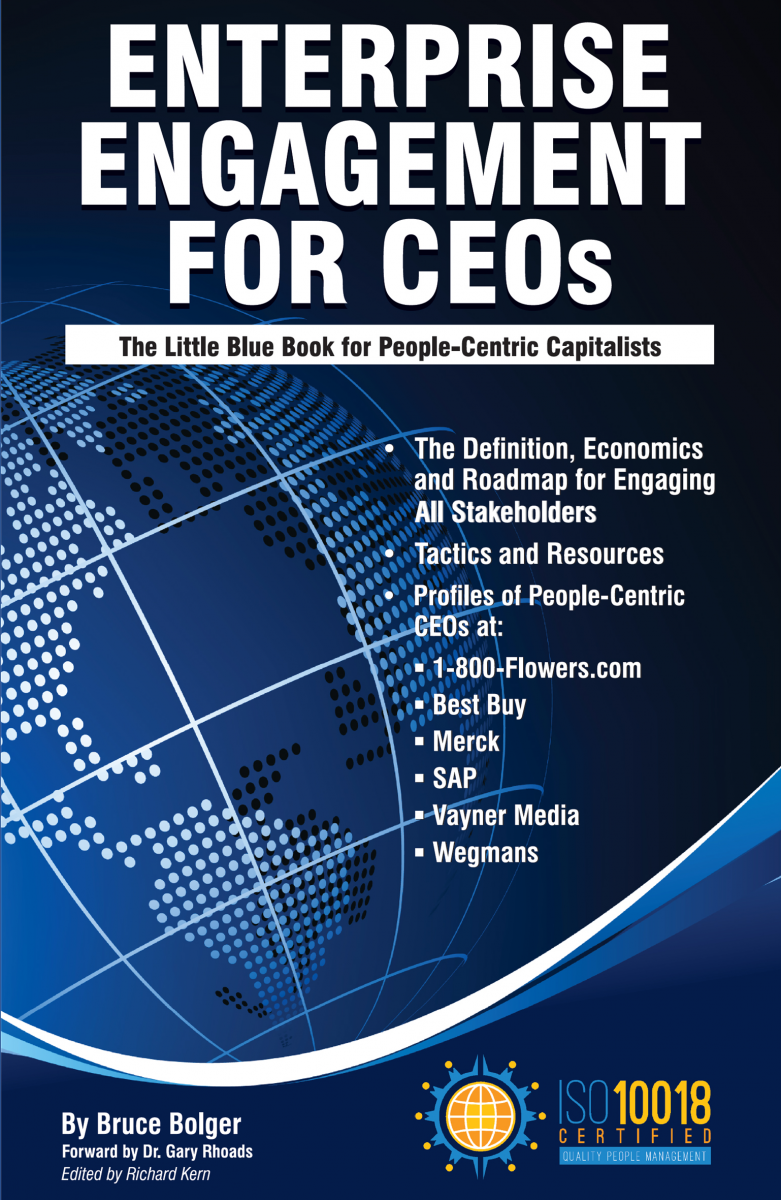
The first and most comprehensive book on Enterprise Engagement and the new ISO 9001 and ISO 10018 quality people management standards. Includes 36 chapters detailing how to better integrate and align engagement efforts across the enterprise. (312 pages, $36.)
 Online:
Online:
• 10-minute short course: click here for a 10-minute introduction to Enterprise
• Engagement and ISO standards on Coggno.com.
• 5-minute Audiopedia summary of the Enterprise Engagement field.
Services:
• The International Center for Enterprise Engagement at TheICEE.org, offering: ISO 10018 certification for employers, solution providers, and Enterprise Engagement technology platforms; Human Resources and Human Capital audits for organizations seeking to benchmark their practices and related Advisory services for the hospitality field.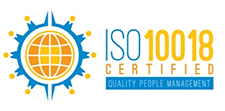
• The Engagement Agency at EngagementAgency.net, offering: complete support services for employers, solution providers, and technology firms seeking to profit from formal engagement practices for themselves or their clients, including Brand and Capability audits for solution providers to make sure their products and services are up to date.
• C-Suite Advisory Service—Education of boards, investors, and C-suite executives on the economics, framework, and implementation processes of Enterprise Engagement.
• Speakers Bureau—Select the right speaker on any aspect of engagement for your next event.
• Mergers and Acquisitions. The Engagement Agency’s Mergers and Acquisition group is aware of multiple companies seeking to purchase firms in the engagement field. Contact Michael Mazer in confidence if your company is potentially for sale at 303-320-3777.
Enterprise Engagement Benchmark Tools: The Enterprise Engagement Alliance offers three tools to help organizations profit from Engagement. Click here to access the tools.
• ROI of Engagement Calculator. Use this tool to determine the potential return-on-investment of an engagement strategy.
• EE Benchmark Indicator. Confidentially benchmark your organization’s Enterprise Engagement practices against organizations and best practices.
• Compare Your Company’s Level of Engagement. Quickly compare your organization’s level of engagement to those of others based on the same criteria as the EEA’s Engaged Company Stock Index.
• Gauge Your Personal Level of Engagement. This survey, donated by Horsepower, enables individuals to gauge their own personal levels of engagement.
For more information, contact Bruce Bolger at Bolger@TheEEA.org, 914-591-7600, ext. 230.



